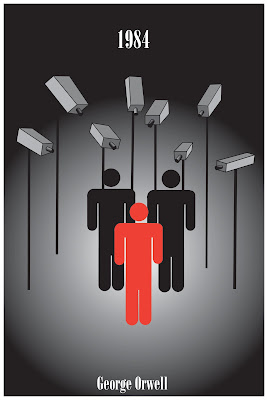
Wednesday, February 24, 2010
Wednesday, February 17, 2010
Monday, February 15, 2010
Wednesday, February 10, 2010
Monday, February 8, 2010
Wednesday, February 3, 2010
Value and Illusion of Space

1. Why is value relative?
- Because the lightness or darkness of a shape is largely determined by its surroundings.
2. Why might high contrast be especially important to commercial artists?
- Since high contrast tends to increase clarity and improve readability, this means that a commercial artist's message can be seen, read, and understood much more easily.
3. How can value help create an illusion of volume, space and depth?
- value graduation can suggest a light source, create a sence of volume, or enhance the illusion of space and depth
4. How many different devices are there to show depth? Name them.
- six; Perspective, overlap, Size variation, definition, location, color
5. In order to understand linear perspective, what must be present?
- a fixed viewing position
6. What is the difference between one-point perspective and two-point perspective?
Monday, February 1, 2010
Line and Rhythm


1. What kind of lines can communicate motion? Stability? Energy?
- Diagonal lines are the most dynamic and suggest motion
- Horizontal lines are the most stable or static.
- While Diagonal lines possess the most energy in movement and action, vertical lines are charged with potential change.
2. Why are human beings able to see "implied" lines?
- Because humans are obsessed with seeking out visual unity and connection.
3. How might a graphic designer use lines differently than a fine artist?
- A graphic designer will use lines in a simplistic, but meaningful manner to clearly display ideas, whereas an arts might use more complex lines to convey an idea and and emotion.
4. How is visual rhythm different than musical rhythm?
- Visual rhythm uses the pattern of differences in visual media rather than auditory media.
5. What must be present for rhythm to exist?
- Visual conflict or contrast
Subscribe to:
Posts (Atom)













